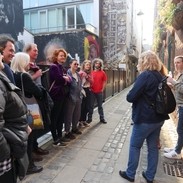What do I tell?

Fun and participation: What can you do?
Make sustainability entertaining and participatory to create meaningful memories.
Help your customers to enjoy themselves and to experience ‘hands on’ what makes your business special. Simple, fun words are more likely to sell. And invite your customers to participate in things they can relate to.
Doing is more fun than watching, so give your customer the chance to pick their own lunch: It will taste all the better for it and become much memorable.
Why not develop a family quiz to help your customers explore the places they visit and learn more about them? You could offer a nature, town or city trail that leaves from your front door.
Consider inviting them to participate in activities they can relate to, be it historic homes, there’s a good reason the kitchens attract as much attention as the stately rooms. Likewise, allow the children to use the dressing-up box in the servants’ hall and see how much fun they will have!
It’s often effective to position things differently depending on your audience. Fresh farm eggs might mean traditions and nostalgia to the older market, but to young families they present an opportunity for children to learn where food comes from. Just calling them ‘sustainable eggs’ means nothing to anybody. And always remember to use the right words and messages for your chosen target audience. This will mean changing the way you describe things, according to whom is listening.
Honestly authentic hiking tours
Through our communication, customers relate to our ethos and trail experiences."
raineyrebs

What we do
We take care of every detail so that our customers can discover the authentic, rural English counties. This includes visits to a selection of historic places and rural businesses to support the local economies. We encourage our customers to take an interest and pride in the ‘real’ England.
How we tell
We are honest about our ethos and that’s why everything we do, including our communication, reflects our values and principles. Instead of saying we are ‘green’, we tell customers our story - how and why we started this business. This way, people get to know the ‘real us.
We use simple messages that people can easily remember and relate their experiences to. Three words describe our trails: ‘real’, ‘journey’ and ‘crafted’. Real refers to a genuine experience avoiding crowded hot spots. Journey is about them actively enjoying every moment. Crafted reflects the fact that we have carefully chosen outstanding country paths, inns and pubs to ensure our customers experience what the authentic village is all about.
After booking, we send ‘walk boxes’ with their perfect itinerary and tailored maps. We thank them for sharing our ethos. Our boxes have messages explaining they are made of recycled materials and filled with wood wool, a natural waste product.
Our top tip
Communicate with honesty and consistency about your ethos, who you are and the uniqueness of your products. This makes customers trust you and relate to the experiences you offer.
Better service makes me feel special
Holidays are times to put yourself first, while business travellers will want you to get things right quickly.
Put the customer at the centre of the experience: what’s in it for them? Word your information thinking about how you want your customers to feel, instead of listing your product’s features or attributes.
Write about sustainability in terms of pampering – as having something unique about looking after your customers. Find ways of showing that the business is looked after, to provide a ‘feel good factor’.
It’s both what you say and how you say it that matters.
What will sell more?
- Fresh, unadulterated, honest food that makes holidaying memorable, or;
- Food miles and supporting the local economy.
Heart warming
Connect visitors with the local community
Demonstrating clear ways their custom is doing just this will make them feel better about your business and of course, make a difference in your local area. Things to consider include:
- Working with a local primary school to promote healthy food and make financial contributions to their pupils’ educational trips.
- Raise funds for a local cause by including a small donation on particular menu items. Let customers know what previous donations have been spent on, so that they can see what a difference they can make.
- Source fresh herbs and vegetables for your menu that have been grown by local schools or community groups.
- Arrange evening classes, talks or other activities and invite local people in to join these as well as your guests. This will increase the audience size and help make events more cost efficient, allow guests and locals to mingle and position your business as an asset to the community.
There is no substitute for a good product. But you can provide a better service by giving customers something additional to feel good about.
Tradition - share nostalgia
In leisure and tourism, nostalgia sells because it is comforting
When the environment and society seem under threat, people get nostalgic and value tradition. This is your opportunity to show you share their worries about the future and emphasise your authenticity.
Health, environmental and financial crises have an impact on our views of the world and on our behaviours. This can lead to negative emotions such as feeling depressed, or positive actions such as finding new ways to help the planet or save money.
But, for most people, one thing that tends to happen consistently in a crisis is a feeling of nostalgia and valuing tradition. Sustainability plays an important role because of its core principle to preserve resources for future generations.
“Nostalgia tourism – driven by consumers’ uncertainty about the future – will play a role in choosing leisure and tourism activities due to its wider links to authenticity and meaning”, according to VisitEngland.
Nostalgic tourists look for real experiences where nostalgia is not a reason to be sad, but rather, to appreciate local history, tradition, and customs with people that care about preserving them.
This nostalgia can be helpful when promoting ‘staycations’ and domestic holidays, and it can also attract international tourists to mature destinations like England.
Directly or indirectly, use messages that will attract customers by showing that you share the same worries and values as them. Make them feel your business values tradition and has something comforting to offer.
Empathy: we think alike
Make a personal connection and show that you care
Globalisation has led to people feeling they are often treated like numbers. This standardisation isn’t good customer service, and businesses find that a more human touch is really welcome.
Find opportunities to show a personal connection between you and your guest. Be a ‘personal’ host and not some bland corporate entity. Display this message in words and with pictures, using a more informal tone. Write in the first person and include a photo of yourself as host on your website or on social media. Talk about your surroundings and show that you care about them. This tells your customer that it matters, and that’s all part of the welcome.
Every time a customer books a holiday or business trip, or chooses a day out, there’s an element of risk. They may end up wondering whether they’ve made a mistake. Showing empathy reduces that perception of risk because you communicate trust.
You can use sustainability messages to reassure customers that you are a quality business. Display your many awards and quality grading. Assure your customers that you care about the environment and society and you also care about them – and how they will enjoy their time with you.
Belonging together
Here, sustainability makes visitors feel comfortable and inspired."
Getty Images

What we do
We provide the perfect combination of comfort and working facilities in our training, meeting venue and farm. We offer a real quality product for people to experience sustainability and even learn environmental practices. for example, our insulated systems in walls, floors and roofs to reduce heat consumption, a rainwater re-cycling system and composted vegetable waste.
How we tell
We target people with similar values and those simply looking for different, creative, visionary environments. We talk about our practices and explain what our venue offers – a stimulating, brighter and fresher place than their office, but with home comforts.
When visitors come, we welcome them with a presentation about our achievements and show them our creative facilities and green inspiring solutions, which are not only good for the planet, but also for providing a warm, comfortable environment for everybody to enjoy at work or home.
Then, it’s all about visitors loving their stay, getting inspired and thinking out of the box, while experiencing sustainability everywhere. From our cosy and warm environment to savouring a meal made with our farm’s ingredients, from our bright and uplifting rooms decorated with local wood to home-made refreshments.
Our top tip
For those customer groups with values similar to yours, emphasise that sense of belonging that comes from showing that you understand what’s important to them.
Navigation
Previous:
Next:







